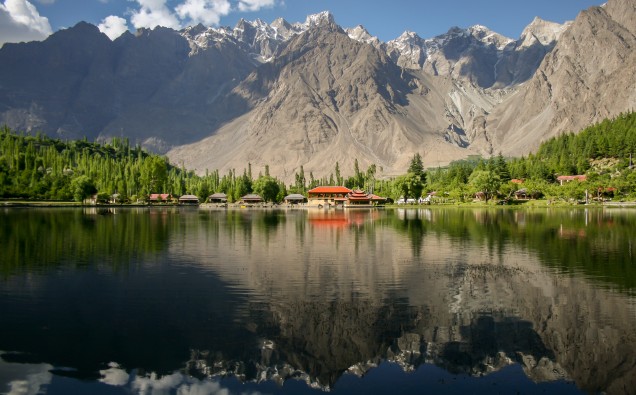
Shangrila Resort Skardu ,Photo Credit: Zaeem Siddiq/Wikimedia Commons
The ease and speed of traveling and doing global business are likely to fuel human curiosity for discovery and help the number of world tourists grow exponentially to 1.8 billion in the next 12 years – meaning one in every five individuals will be a tourist by 2030.
This massive surge in tourism from the current 1.2 billion per year means a lot of industries associated with tourism stand to gain financially from the growth.
What else will be the big gainer?
It could very well be globalization part two – a massive interpersonal, intercultural experience of the new generation, already learning so much about one another in the digitally connected world.
And with such unprecedented and vast coming together comes the possibility of understanding of diversity in the times of celebration and empathy in the times of troubles and disasters.
“It is bringing the world together in an incredibly impressive way: it is making the world smaller, more connected, more informed, and therefore… a more caring world,” says Taleb Rifai, the Secretary-General of United Nations World Tourism Organization, who predicted the figure for worldwide tourists to be 1.8 billion by 2030.
But will such a hopeful scenario offset the current trends like xenophobia, apathy, animosity and geostrategic rivalries? The prospects of that happening in the near future sound hollow in the face of political discords and regional and international rivalries playing out with deadly consequences in several countries and regions.
The descent of countries, societies and cultures into chaos and bloodshed makes the dream of world peace look distant.
So, how far can tourism help the cause of peace ?

This photograph, “East West Jubilation” by Rabin Chakrabarti, was a runner-up in UNWTO’s 2011 World Tourism Day photo contest
The answer may be found in the emerging technologies and new forms of media that are evolving but struggling to break barriers built over centuries of wars, fights and differences.
Alongside human and political mayhem have come a few more globalizing phenomena – like the Internet of Things that connects people with news, research and information at an unprecedented speed. Then there is the power of the social media platforms. These tools empower individuals and communities politically as seen in the case of Arab Spring of revolutions.
Yet, this newfound freedom could be fragile as autocratic governments can shut them down, and ban and freeze cell phone communication.
Then, the world including champions of democracy can also disappoint the advocates of democracy at the altar of political expediency.
On the other hand, we have also seen how far right groups and politicians in Europe and the United States exploit media portrayals and demonization of “the other” – refugees and immigrants, cutting off communities, and leaving them to suffer. Terrorist organizations like ISIS have also used the same social media platforms to spread their narratives and misguide young and vulnerable people into joining them.
This simultaneous occurrence of the brave new links and fear-fed human disconnects represents a huge challenge for those who wish to see the planet a peaceful place.
In this context, can the massive worldwide growth in tourism, as forecast by the UN, help a genuine meeting of cultures? Can affinity and understanding help rescue the Middle East from its deep morass of sectarian and militant conflicts? And what about the world power competition that has been exacting a heavy toll on humanity?
Can tourism-fueled development save Africa from hunger, droughts and kick-start its hidden potentials? Will new leaders replace the South China Sea tensions with pathways to mutual cooperation? These questions are too big, having too many unknowns and addressing all of these through tourism amount to asking too much of one single source of human activity.
But then, tourism is not just a uni-dimensional one-off thing. It is a process that touches many aspects of human life and civilization. Throughout human history, the great spirit of tourism, curiosity and adventure have led to discovery of new lands, cultures and new research-based enlightenment and meeting of cultures. A great tourist is a great observer and with his/her reports strikes common human chords between communities as well as points out injustices facing communities and countries he/she visits.
The projected expansion in tourism in itself will not be a single most important driver of the future trends. Clearly, it will be up to the people and their political leaders to shape a mutually beneficial world.
A huge increase in tourism has also the dimension of pollution.
Other ongoing issues related to tourism include, waste, labor exploitation, prostitution and abuse of children, and looting of natural resources, as noted by the UN official.
Given that all human activity has both advantages and disadvantages, it is up to people to ensure that the impacts from tourism are positive and contribute to sustainable development, Rifai noted in an interview with UN Radio.
“1.8 billion travellers by 2030 could be 1.8 billion opportunities or 1.8 billion disasters and it is all up to us [to choose].”
The year 2017, observed as the International Year of Sustainable Tourism for Development, has seen both negative and hopeful effects of tourism.
The opposing trends could indicate the possibilities of things to come – a mix of potential for economic growth and human harmony as well as fears of unchecked crimes and exploitation of the disadvantaged.
Turning the world into a Shangrila of peace, harmony and unbreakable human bonds might seem a pipe dream amidst ongoing violence and sufferings that human beings are inflicting on one another. But is there a better way than meeting and experiencing first-hand diverse cultures to overcome doubts, and even to resolve conflicts. Diplomacy many be the official way of achieving peace but tourism in the peoples’ way of fostering affinity, peace and harmony.


















